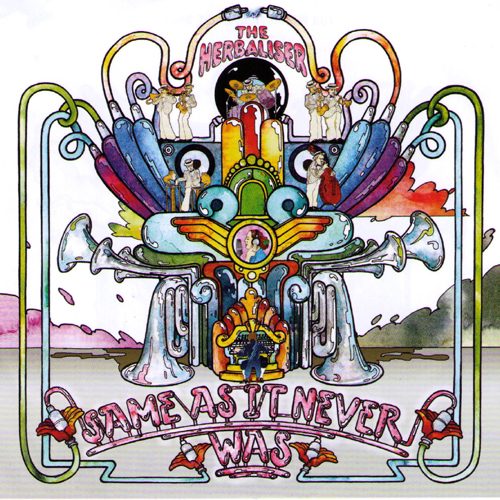Forgoing your traditional sample-heavy sound in favor of live instrumentation seems to be all the rage these days. The new albums by Atmosphere and Lyrics Born tried it, both with mixed results, and London’s The Herbaliser have gone the same route for their sixth full-length, “Same as it Never Was.” After touring extensively with a live band, the original duo of Jake Wherry and Ollie Teeba have added to the studio mix Jessica Darling on vocals, Ralph Lamb on trumpet, and Andy Ross on flute and saxophone. The result is a funk explosion of booty-shaking proportions that veritably oozes soul out of every nook and cranny, making this the group’s finest album to date.
Even a casual listen makes clear that these guys don’t just make beats. They craft musical soundscapes, meticulously building compositions piece by piece a la DJ Shadow or Rjd2, except that the live instruments give the songs a weightier presence – less ethereal, more embodied – than those artists’ sample-based songs. The title track is a case in point, with its horn-driven melody anchored by funk-style electric guitars and on point scratching by Teeba. It displays a typically highly developed song structure which steadily builds, adding layers of instrumentation – including trumpet, sax, and synth – and then breaks down to its base of organs and the chanted refrain of the album’s title. Like a third of the album’s songs, this one is purely instrumental but so involving that you notice more the musical intricacy than the lack of vocals.
The next track, “On Your Knees,” introduces us to Jessica Darling, the group’s new full-time singer who features on about half of the songs. This girl has a set of pipes reminiscent of the UK’s recent stock of blue-eyed soul divas but with a slight grit that adds gravity and puts them all to shame. Both her voice and her melodies have a vintage feel to them, meaning that they seem oddly familiar even while they’re refreshingly original. Once again, funky guitars, heavily loaded with wah effects, are the musical backbone and are augmented by saxophone stabs and scratches. Darling’s nah-nah-nah breakdown plays tag with Teeba’s scratching midway through the song, an example of the perfect union of vocals and instrumentation The Herbaliser achieve so often on this release.
The other tracks that feature Darling follow in a similar vein and are generally the album’s best. In particular, her performance on “Can’t Help This Feeling” is some serious, head-nodding soul, and she even incorporates a piece of The Temptations’ “Get Ready” into her melody for added listening pleasure. “You’re Not All That” is another bit of throwback goodness where she croons the song’s title and then promises, “I can change that if you want me to.”
The more straightforward hip hop tracks are great as well, but they tend to sound timid in comparison to the boisterous instrumentals that accompany Darling’s melodies. “Just Won’t Stop” featuring Yungun Aka Essa is a more loop-based song composed from slinky guitars and subtle horns, punctuated by strings here and there. This British MC possesses an understated vocal style that works well with his nonchalant flow and lyrics about rap’s development and change. He flips some nice rhymes that you might not catch the first time around and ponders hip hop’s current state: “It’s a logical progression / The riot don’t stop but it’s got a new direction…Hip hop’s dead, that’s what they said on the news / Nah – it’s still alive but it’s getting confused.” The accordion and bass drum loop of “Game Set & Match” featuring More Or Les is a bit underwhelming after all that came before, but Jean Grae’s show-stealing performance on “Street Karma (A Cautionary Tale)” proves this group’s ability to create dope hip hop backdrops. Over a punchy bassline and eerie flutes, Jean weaves together a gripping tale of friendship and betrayal complete with visual details that make this one seem like classic Hollywood film noir with a backbeat.
The Herbaliser prove their diversity throughout, with a wide array of styles ranging from straight-ahead hip hop loop-digging to classic funk and soul. They also throw a couple out of left-field on their instrumental tracks, as on the spy film soundtrack groove of “The Next Spot” and, especially, the sun-baked ska sound of “Amores Bongo.” While they traverse freely across genre boundaries, the album manages to stay cohesive, a testament to the group’s craftsmanship.
With its funkdafied grooves and soulful crooning, “Same as it Never Was” is difficult to categorize but easy to score. I try not to hand out 9’s carelessly, but when an album so clearly deserves it, it’s easy to do. Go check this one out. Now.

